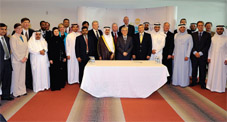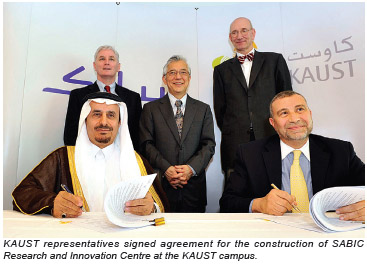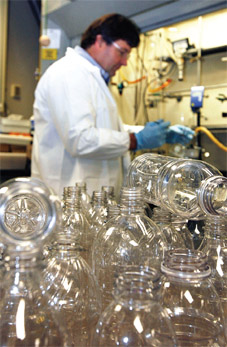
The Kingdom of Saudi Arabia has played a vital role in strengthening research and development (R&D) efforts in plastics processing technology that the country is now serving as a major knowledge centre in the Middle East. The country's King Abdullah University of Science and Technology (KAUST) has tied up with leading players in the global plastics industry to develop new materials and solutions geared to improve production processes and end-products. It recently signed a long-term research and innovation agreement with Saudi Basic Industries Corporation (SABIC) for the construction of the SABIC Research and Innovation Centre at the KAUST campus. The centre is scheduled to begin operations in 2012. The agreement creates the framework whereby SABIC provides construction funding for the SABIC Research and Innovation Centre, as well as support for research on the jointly agreed industry/academic projects to be undertaken there. The long-term investment would bring excellent returns at both the scientific and economic levels, and show strong leadership in innovation that leads to economic development both domestically and globally.

Such cooperation between SABIC and KAUST would lead to many innovations and technical solutions to serve the industrial sectors in Saudi Arabia, the region and the world. Moreover, the long-term cooperation with KAUST is also expected to launch creative careers in research and technical fields and further strengthen SABIC's position in technology and innovation fields for years to come. KAUST President, Professor Choon Fong Shih, said, "From its early commitment as a founding member of our Industrial Collaboration Program, SABIC has demonstrated its understanding of KAUST's unique capabilities which enable us to build synergies among research, education, innovation and enterprise, as well as to harness science and technology to address global challenges of our time - for the benefit of the Kingdom and beyond." The SABIC Centre for Research and Innovation will work to strengthen the collaboration and innovative goals shared by SABIC and KAUST, and employ between 100 and 150 scientists on research and technology projects, especially in the areas of catalysis, composites and membranes. When completed, it will join two other technical centres now being developed in Shanghai (China) and Bangalore (India) as part of a global network numbering 16 research centres. Focus on infrastructure technologies Earlier, the Dow Chemical Company announced its vision for its proposed Middle East and Africa Research and Development (R&D) Centre at KAUST during the Dow Innovation Summit. The summit sealed the multi-year, multi-million dollar R&D collaboration announced in September 2009. Three areas have been cited as focus for the collaboration--water science, oil and gas and infrastructure technologies. The Dow's Centre is aligned with the company's strategy as a science and technology-oriented company. The collaboration with KAUST, according to Dow, reflects its commitment to intellectual growth in Saudi Arabia. Dow Chemicals' presence in Saudi Arabia began with two subsequent joint ventures with E.A. Juffali & Brothers, Arabian Chemical Company Ltd., manufacturing Styrofoam brand insulation in Jeddah and latex production in Jubail. In 2007, it signed an agreement with Saudi Aramco for the construction, ownership and operation of a world-scale chemicals and plastics production complex in Saudi Arabia, named the Ras Tanura Integrated Project (RTIP). RTIP is among the world's largest petrochemical facilities and represents the largest foreign direct investment to date in Saudi Arabia's petrochemical sector.

Developing "green" plastics The King Abdulaziz City for Science and Technology (KACST) has an existing agreement with the compu
Nike Air Max 97 The Kingdom of Saudi Arabia has played a vital role in strengthening research and development (R&D) efforts in plastics processing technology that the country is now serving as a major knowledge centre in the Middle East. The country's King Abdullah University of Science and Technology (KAUST) has tied up with leading players in the global plastics industry to develop new materials and solutions geared to improve production processes and end-products. It recently signed a long-term research and innovation agreement with Saudi Basic Industries Corporation (SABIC) for the construction of the SABIC Research and Innovation Centre at the KAUST campus. The centre is scheduled to begin operations in 2012. The agreement creates the framework whereby SABIC provides construction funding for the SABIC Research and Innovation Centre, as well as support for research on the jointly agreed industry/academic projects to be undertaken there. The long-term investment would bring excellent returns at both the scientific and economic levels, and show strong leadership in innovation that leads to economic development both domestically and globally.
The Kingdom of Saudi Arabia has played a vital role in strengthening research and development (R&D) efforts in plastics processing technology that the country is now serving as a major knowledge centre in the Middle East. The country's King Abdullah University of Science and Technology (KAUST) has tied up with leading players in the global plastics industry to develop new materials and solutions geared to improve production processes and end-products. It recently signed a long-term research and innovation agreement with Saudi Basic Industries Corporation (SABIC) for the construction of the SABIC Research and Innovation Centre at the KAUST campus. The centre is scheduled to begin operations in 2012. The agreement creates the framework whereby SABIC provides construction funding for the SABIC Research and Innovation Centre, as well as support for research on the jointly agreed industry/academic projects to be undertaken there. The long-term investment would bring excellent returns at both the scientific and economic levels, and show strong leadership in innovation that leads to economic development both domestically and globally.  Such cooperation between SABIC and KAUST would lead to many innovations and technical solutions to serve the industrial sectors in Saudi Arabia, the region and the world. Moreover, the long-term cooperation with KAUST is also expected to launch creative careers in research and technical fields and further strengthen SABIC's position in technology and innovation fields for years to come. KAUST President, Professor Choon Fong Shih, said, "From its early commitment as a founding member of our Industrial Collaboration Program, SABIC has demonstrated its understanding of KAUST's unique capabilities which enable us to build synergies among research, education, innovation and enterprise, as well as to harness science and technology to address global challenges of our time - for the benefit of the Kingdom and beyond." The SABIC Centre for Research and Innovation will work to strengthen the collaboration and innovative goals shared by SABIC and KAUST, and employ between 100 and 150 scientists on research and technology projects, especially in the areas of catalysis, composites and membranes. When completed, it will join two other technical centres now being developed in Shanghai (China) and Bangalore (India) as part of a global network numbering 16 research centres. Focus on infrastructure technologies Earlier, the Dow Chemical Company announced its vision for its proposed Middle East and Africa Research and Development (R&D) Centre at KAUST during the Dow Innovation Summit. The summit sealed the multi-year, multi-million dollar R&D collaboration announced in September 2009. Three areas have been cited as focus for the collaboration--water science, oil and gas and infrastructure technologies. The Dow's Centre is aligned with the company's strategy as a science and technology-oriented company. The collaboration with KAUST, according to Dow, reflects its commitment to intellectual growth in Saudi Arabia. Dow Chemicals' presence in Saudi Arabia began with two subsequent joint ventures with E.A. Juffali & Brothers, Arabian Chemical Company Ltd., manufacturing Styrofoam brand insulation in Jeddah and latex production in Jubail. In 2007, it signed an agreement with Saudi Aramco for the construction, ownership and operation of a world-scale chemicals and plastics production complex in Saudi Arabia, named the Ras Tanura Integrated Project (RTIP). RTIP is among the world's largest petrochemical facilities and represents the largest foreign direct investment to date in Saudi Arabia's petrochemical sector.
Such cooperation between SABIC and KAUST would lead to many innovations and technical solutions to serve the industrial sectors in Saudi Arabia, the region and the world. Moreover, the long-term cooperation with KAUST is also expected to launch creative careers in research and technical fields and further strengthen SABIC's position in technology and innovation fields for years to come. KAUST President, Professor Choon Fong Shih, said, "From its early commitment as a founding member of our Industrial Collaboration Program, SABIC has demonstrated its understanding of KAUST's unique capabilities which enable us to build synergies among research, education, innovation and enterprise, as well as to harness science and technology to address global challenges of our time - for the benefit of the Kingdom and beyond." The SABIC Centre for Research and Innovation will work to strengthen the collaboration and innovative goals shared by SABIC and KAUST, and employ between 100 and 150 scientists on research and technology projects, especially in the areas of catalysis, composites and membranes. When completed, it will join two other technical centres now being developed in Shanghai (China) and Bangalore (India) as part of a global network numbering 16 research centres. Focus on infrastructure technologies Earlier, the Dow Chemical Company announced its vision for its proposed Middle East and Africa Research and Development (R&D) Centre at KAUST during the Dow Innovation Summit. The summit sealed the multi-year, multi-million dollar R&D collaboration announced in September 2009. Three areas have been cited as focus for the collaboration--water science, oil and gas and infrastructure technologies. The Dow's Centre is aligned with the company's strategy as a science and technology-oriented company. The collaboration with KAUST, according to Dow, reflects its commitment to intellectual growth in Saudi Arabia. Dow Chemicals' presence in Saudi Arabia began with two subsequent joint ventures with E.A. Juffali & Brothers, Arabian Chemical Company Ltd., manufacturing Styrofoam brand insulation in Jeddah and latex production in Jubail. In 2007, it signed an agreement with Saudi Aramco for the construction, ownership and operation of a world-scale chemicals and plastics production complex in Saudi Arabia, named the Ras Tanura Integrated Project (RTIP). RTIP is among the world's largest petrochemical facilities and represents the largest foreign direct investment to date in Saudi Arabia's petrochemical sector.  Developing "green" plastics The King Abdulaziz City for Science and Technology (KACST) has an existing agreement with the compuNike Air Max 97
Developing "green" plastics The King Abdulaziz City for Science and Technology (KACST) has an existing agreement with the compuNike Air Max 97
 iConnectHub
iConnectHub
 Login/Register
Login/Register Supplier Login
Supplier Login



























